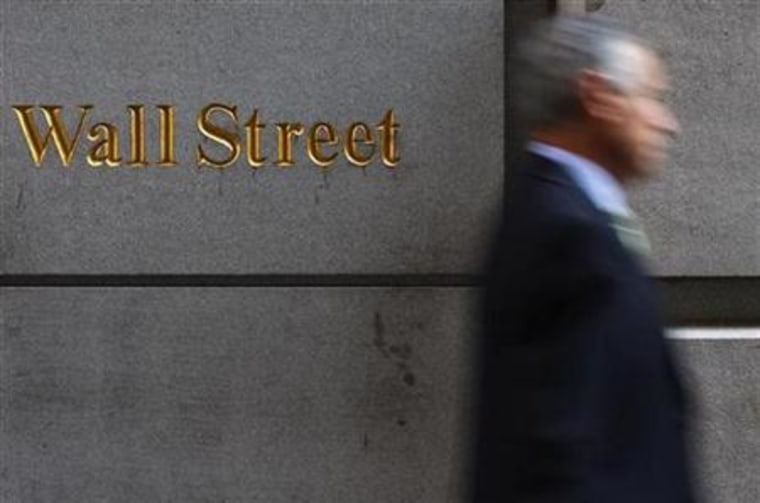Wall Street pay is on pace to break a record high for a second consecutive year, according to a report in Tuesday’s Wall Street Journal.
Some three dozen top banks and securities firms will pay $144 billion in salary and benefits this year, the paper said. That’s a 4 percent increase from the $139 billion paid out in 2009, according to a survey conducted by the Journal. Compensation is expected to rise at 26 of the 35 firms surveyed, including banks, investment banks, hedge funds, money-management firms and securities exchanges.
The report shows revenue is expected to rise at 29 of the firms, but at a slower pace than pay. Wall Street revenue is expected to rise 3 percent, to $448 billion from $433 billion, despite a slowdown in some high-profile activities like stock and bond trading. Wall Street is expected to pay 32.1 percent of its revenue to employees, the same as last year, but down from the 36 percent paid out in 2007, the Journal said.
Profits on Wall Street were depressed by losses over the past two years, but they have bounced back from the 2008 crisis, the paper said. Even so, this year’s estimated profit of $61.3 billion for the firms surveyed still falls about 20 percent short from the record $82 billion made in 2006, the Journal said.
Large Wall Street banks are unlikely to accelerate bonus payouts, however, to help their employees avoid the higher tax rates that may be coming when tax cuts enacted by the Bush administration expire on January 1.
Paying out bonuses early would likely be a public relations disaster for a sector already blamed for the economic downturn, compensation experts noted.
Many analysts and commentators have speculated Wall Street firms might look to pay out early bonuses, helping employees to avoid tax liabilities. But only 36 percent of U.S. financial services employees expect to be paid even part of their 2010 bonus before the end of the year, according to data released Monday by financial job board eFinancialCareers.com.
Morgan Stanley said Monday it was not considering moving up bonus payouts, becoming one of the first large Wall Street firms to dismiss the possibility.
"It's a buzz. There's clearly a fear of taxes changing," said Anton Schutz, president of Mendon Capital Advisors.
Banks have typically paid a large piece of compensation in the form of a year-end bonus, which is usually paid in January.
Paying an employee in December instead of January could allow the bank to spend a few percentage points less in compensation, with employees still taking home the same amount as they would have had they received their pay a few weeks later. Or banks could share some of their savings with employees.
But banks are not “reputationally out of the woods yet to the point where they can be gaming the system,” said Cornelius Hurley, a professor and director of Boston University's Morin Center for Banking and Financial Law.
The folks on Wall Street are apparently thinking they will end the year on a high note.
Fifty percent are expecting a higher bonus than last year, according to eFinancialCareers.com. The survey also found that 21 percent are expecting no change in their bonus compared with last year, while only 9 percent don’t expect any bonus.
Why the big bucks? About one-third cited “personal performance,” while another third said “firm performance” is the primary reason their bonus will increase. Still, nearly 60 percent said market conditions are the top concern among factors that could hold their pay down.
Many industry observers expect a wave of Wall Street layoffs in the coming months.
"It's very hard to justify laying off work force at the same time as accelerating bonuses. It's a public relations disaster," said Steven Eckhaus, a compensation lawyer with Katten Muchin Rosenman LLP.
Boutique banks, private equity firms and other relatively small, privately held companies have the most flexibility to give their employees an early payday, but only 8 percent of employees at big banks expect early payouts, said Constance Melrose, managing director of eFinancialCareers North America.
Bank bonuses, which run to millions of dollars for top staff, became a hot-button issue when the government bailed out banks at the height of the financial crisis.
The U.S. government is still closely scrutinizing the banking industry and enacted in July the sweeping Dodd-Frank financial reform law to regulate many industry practices.
Citigroup Inc. and Goldman Sachs Group Inc. declined to comment on their schedules for paying 2010 bonuses. Representatives for JPMorgan Chase and Co, Wells Fargo & Co and Bank of America Corp were not immediately available for comment.
